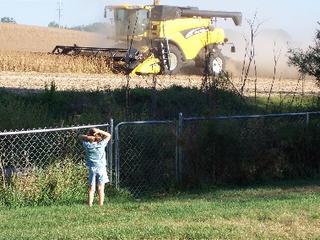
Last week the farmers behind us harvested their soybeans with a very futuristic looking combine. It looked a lot like a Dyson vacuum - but not the one I covet, which is purple and supposed to be especially good at sucking up dog hair.
My son wanted to know why there were two different words for this season. Why both fall and autumn? Which one is it really? Do they mean the same thing? I told him we'd have to google the answer when we got home.
It turns out that this time of year is mainly fall in North America and autumn in Great Britain. This makes sense to me - I bet if I ask most of my neighbors what the names of the four seasons are, they will answer "spring, summer, winter, and fall". They'll probably even list them in that order, though I don't know why it should be so. Possibly it makes sense to start the cycle with spring, but why put winter before fall? Maybe it just sounds better to end on a single syllable. "Winter, spring, summer, and fall" also sounds ok, like you're starting at the beginning of the new year. At any rate, autumn doesn't come into it at all.
In Language and Place, Peter Trudgill explains that
the word autumn is normal in most of southern England, but in parts of the Southwest and in Lincolnshire the traditional dialect word is fall. This reflects the introduction into England in late mediaeval times of the originally French word autumn. This eventually replaced the Anglo-Saxon word fall in Standard English in England and in some of the dialects, but not in others. It is obvious that at one time the use of autumn must have been much less widespread than it is today, since fall was the form which was carried by settlers to North America.
Autumn is definitely a more literary word than fall, although "fall of the leaf", as the season was originally known in England, is rather poetic. Roger Ascham was responsible its first recorded use in 1545, in his book on archery entitled Toxophilus. He explained that it is important to take account of the weather and season when shooting an arrow:
For diversitie of tyme causeth diversitie of wether,
as in the whole yeare,
Sprynge tyme, Somer, Faule of the leafe, and Winter
Peter Trudgill's article goes on explain that "in much of the north of England and Scotland another word, backend, is used" instead of either autumn or fall. After my son finished rolling around the floor after hearing "backend" ("It's the butt of the year!"), we also learned that neither autumn nor fall were used much before 1500 AD. In medieval times, they just called it harvest.
1 comment:
you reminded me of the james taylor song---
"Winter, spring, summer, or fall,
all you have to do is call
and I'll be there, yeah, yeah, yeah.
You've got a friend."
Post a Comment